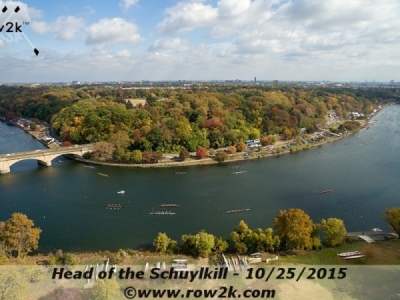
Posted on January 23, 2019
Rowing community officials in Philadelphia have been stating for more than a year that the Schuylkill River, long a center of rowing in the United States, is nearing a point where it will not be able to continue to host regattas, or to even keep the iconic Boathouse Row functioning, without a project to dredge out silt that has been building up for more than 50 years.
While there has been progress in raising the $4.5 million to fund the project to dig out both the race course and the waterway in front of Boathouse Row, a projected date of January 1st to have the funds in place has come and gone, and there remains a shortfall of $1.3 million to get the project going.
Next, a more finite deadline of early March to have the money in place to begin bidding the project in time to begin work in July is quickly approaching. According to Paul Laskow, chairman of the Schuylkill Navy River Restoration Committee, if that deadline is missed, the 2020 regatta season will lose some of its biggest events.
“The March deadline is not arbitrary,” Laskow said. “That is the deadline for getting the funding arrangements to a state where we could be confident that the project could be bid in May and awarded in June and commence in July.”
It has been nearly 20 years since the last time the Schuylkill River was dredged along Boathouse Row, and close to 50 since the race course on Kelly Drive saw any work on the river bed, Laskow said. In that time, the buildup of silt coming downstream into Fairmount Park has rendered the course unfair across all six racing lanes because of the variation in depth.

Silt buildup is visible in this recent drone shot. (photo by Chris Dantonio Drone Photography)
In front of Boathouse Row, where the river bed fills in more quickly because of the dam near the Philadelphia Art Museum, boat clubs are finding it hard to have enough water to get crews and coaching launches on the water.
The last round of work, done along Boathouse Row in 2000, was paid for with federal funding, but that revenue stream was formally eliminated last June after a five-year effort, and the city and the rowing community was informed that the project would have to be funded locally.
Laskow said that the members of the Schuylkill Navy, the organization that governs the boat clubs and organizations that use the river, asked Philadelphia city officials to get involved to help find a solution.
Between the city and Schuylkill Navy, about $3.5 of the necessary money has been raised, but efforts to get contributions from the six colleges that use the river regularly have fallen short.
“When we didn’t get the federal funding, we turned to a Plan B, a partnership between the city, the rowing community, and (the six city colleges that use the river) to take the lead for funding.”
Laskow said Philadelphia officials took the lead in the funding effort and began conversations with the six colleges. “There were several meetings, a lot of conversations, and Penn, Drexel and Temple fairly quickly agreed to make material contributions,” he said.
“They have continued to have conversations with Jefferson, La Salle and St. Joe’s, but those schools have listed other priorities,” Laskow said.
The city has been approaching private foundations and individuals to try and close the gap, but a $1.3 million shortfall continues to exist.
According to Laskow and Schuylkill Navy Vice Commodore Bonnie Mueller, if the money is not secured by early March, the project cannot begin and regattas on the 2020 schedule will have to be moved to other venues, including Cooper River in Camden, New Jersey.

Stotesbury Cup racing in Camden with Philadelphia skyline in the background
Laskow pointed out that one of the largest regattas of the Schuylkill racing season, the Stotesbury Cup Regatta, was successfully run in Camden last spring when weather conditions rendered the Schuylkill unsafe for rowing.
“If the funding is not completed, we will not be able to do a 2019 dredge,” said Mueller. “We are close, but we are not there. I think until you have a commitment, until we have secured the funding package that we need to have, we should be worried.
“I am concerned and worried, but at the same time, I am hopeful because we are doing things to close that gap,” Mueller said.
“We have a plan and it is not stalled, but it will take individuals and organizations deciding that we need to continue to have recreational use of the Schuylkill River and to preserve the history of that recreational use on this body of water, and that they need to be a part of solving this problem.”

Finals racing at the 2017 Stotesbury Cup Regatta
Source: ROW2K.COM





